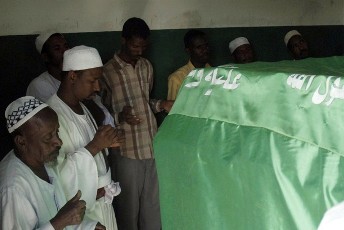Sudanese Sufi group renounces agreement with SPLM-N
March 16, 2013 (KHARTOUM) – The Sudanese religious Sufi group of Qadiriya-Arakia, headed by Sheikh Abdalla Azraq Taybba, distanced itself from a memorandum of understanding signed in its name with the Sudanese People’s Liberation Movement-North (SPLM-N) this week.

The statement stressed that the group has nothing to do with the memorandum, saying that its head had previously launched an initiative called the “National Project for Trust Building and Consolidation of Peace, Democracy, and National Unity” targeting all parties to the conflict, including the government, the Sudan Revolutionary Front (SRF), and the leaders of the various Sudanese political parties.
The memorandum, which was signed on Thursday, provided for the need to build a democratic state which respects pluralism and diversity and is governed by justice, equality and freedom.
The NCP says the memo, which underscores the need to adopt armed struggle as well as the peaceful means to overthrow the regime and build a democratic Sudan and establish a federal system of governance in which people are the only source of power with rights and duties defined based on citizenship, represents a serious threat to the unity and cohesion of the Sudanese people.
The two signatories agreed on passing a constitution which recognises the separation of religious institutions from state institutions in order to prevent the exploitation of religion in politics, stating that the “tolerant Sufi approach and the New Sudan project can provide the right answers to governance and reform of public life in Sudan”.
The memorandum, which was signed by SPLM-N representative Yasser Ja’afar Sanhuri and the Qadiriya-Arakia group’s representative provided for the need to hold accountable the perpetrators and violators of international humanitarian law and human rights convention, as well as restructuring of the army, police and security apparatus to establish principles of nationalism, professionalism and impartiality, along with independence of the judiciary, civil service, media and higher education.
The document is similar to the “New Dawn” charter signed by Sudanese opposition parties and armed rebel groups in Uganda last January which came under fire from the NCP which accused its signatories of seeking to change Sudan’s Arab-Islamic identity.
(ST)
